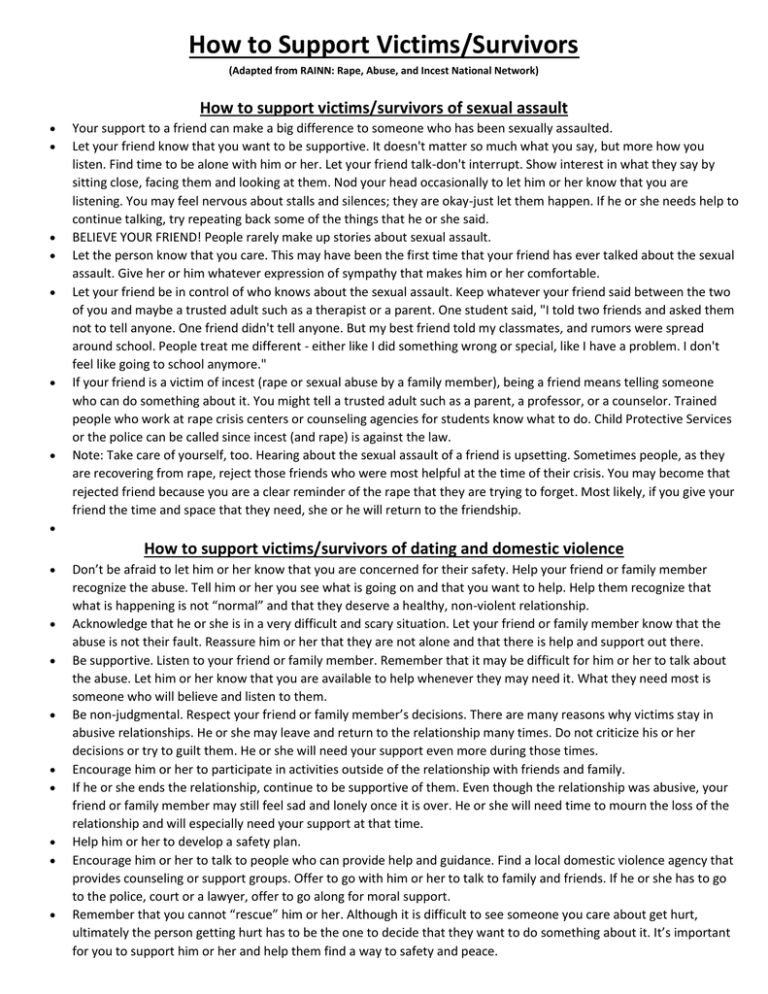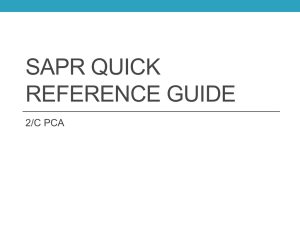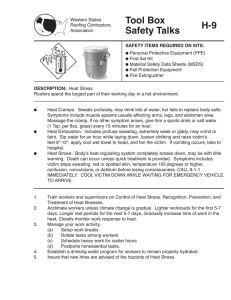
How to Support Victims/Survivors
(Adapted from RAINN: Rape, Abuse, and Incest National Network)
How to support victims/survivors of sexual assault
Your support to a friend can make a big difference to someone who has been sexually assaulted.
Let your friend know that you want to be supportive. It doesn't matter so much what you say, but more how you
listen. Find time to be alone with him or her. Let your friend talk-don't interrupt. Show interest in what they say by
sitting close, facing them and looking at them. Nod your head occasionally to let him or her know that you are
listening. You may feel nervous about stalls and silences; they are okay-just let them happen. If he or she needs help to
continue talking, try repeating back some of the things that he or she said.
BELIEVE YOUR FRIEND! People rarely make up stories about sexual assault.
Let the person know that you care. This may have been the first time that your friend has ever talked about the sexual
assault. Give her or him whatever expression of sympathy that makes him or her comfortable.
Let your friend be in control of who knows about the sexual assault. Keep whatever your friend said between the two
of you and maybe a trusted adult such as a therapist or a parent. One student said, "I told two friends and asked them
not to tell anyone. One friend didn't tell anyone. But my best friend told my classmates, and rumors were spread
around school. People treat me different - either like I did something wrong or special, like I have a problem. I don't
feel like going to school anymore."
If your friend is a victim of incest (rape or sexual abuse by a family member), being a friend means telling someone
who can do something about it. You might tell a trusted adult such as a parent, a professor, or a counselor. Trained
people who work at rape crisis centers or counseling agencies for students know what to do. Child Protective Services
or the police can be called since incest (and rape) is against the law.
Note: Take care of yourself, too. Hearing about the sexual assault of a friend is upsetting. Sometimes people, as they
are recovering from rape, reject those friends who were most helpful at the time of their crisis. You may become that
rejected friend because you are a clear reminder of the rape that they are trying to forget. Most likely, if you give your
friend the time and space that they need, she or he will return to the friendship.
How to support victims/survivors of dating and domestic violence
Don’t be afraid to let him or her know that you are concerned for their safety. Help your friend or family member
recognize the abuse. Tell him or her you see what is going on and that you want to help. Help them recognize that
what is happening is not “normal” and that they deserve a healthy, non-violent relationship.
Acknowledge that he or she is in a very difficult and scary situation. Let your friend or family member know that the
abuse is not their fault. Reassure him or her that they are not alone and that there is help and support out there.
Be supportive. Listen to your friend or family member. Remember that it may be difficult for him or her to talk about
the abuse. Let him or her know that you are available to help whenever they may need it. What they need most is
someone who will believe and listen to them.
Be non-judgmental. Respect your friend or family member’s decisions. There are many reasons why victims stay in
abusive relationships. He or she may leave and return to the relationship many times. Do not criticize his or her
decisions or try to guilt them. He or she will need your support even more during those times.
Encourage him or her to participate in activities outside of the relationship with friends and family.
If he or she ends the relationship, continue to be supportive of them. Even though the relationship was abusive, your
friend or family member may still feel sad and lonely once it is over. He or she will need time to mourn the loss of the
relationship and will especially need your support at that time.
Help him or her to develop a safety plan.
Encourage him or her to talk to people who can provide help and guidance. Find a local domestic violence agency that
provides counseling or support groups. Offer to go with him or her to talk to family and friends. If he or she has to go
to the police, court or a lawyer, offer to go along for moral support.
Remember that you cannot “rescue” him or her. Although it is difficult to see someone you care about get hurt,
ultimately the person getting hurt has to be the one to decide that they want to do something about it. It’s important
for you to support him or her and help them find a way to safety and peace.
How to support victims/survivors of stalking
Listen.
Show support.
Don’t blame the victim for the crime.
Remember that every situation is different, and allow the survivor being stalked to make choices about how to handle
it.
Find someone you can talk to about the situation.
Take steps to ensure your own safety.
How to be supportive
There are many ways that you can help a friend or family member who is a victim/survivor or those impacted by sexual
assault, dating/domestic violence, and stalking.
Listen. Be there. Always believe the victim/survivor when they confide in you. Don’t be judgmental.
Be patient. Remember, it will take the victim/survivor some time to deal with the crime.
Help to empower the victim/survivor. Sexual assault, dating/domestic violence, and stalking are all crimes that take
away an individual’s power, and it is important not to compound this experience by putting pressure on the
victim/survivor to do things that he or she is not ready to do yet.
Be sure the victim/survivor is not in any serious danger or displaying suicidal behaviors. If they are in danger or
considering suicide, help them create a plan to be safe. This might include notifying police or family, keeping them
company, or helping move to an anonymous location.
Let the victim/survivor know that help and support is available on campus through Victim Advocacy Services to help
coordinate campus resources for the victim/survivor. Victim Advocacy Services is completely confidential and FREE to
all Northern Illinois University Students.
If the survivor is willing to seek medical attention or report the crime, offer to accompany him or her wherever they
need to go (police station, hospital, Victim Advocacy Services, etc.).
Encourage the victim/survivor to reach out for help, but realize that only the victim/survivor can make the decision to
get help.
What a victim/survivor may be experiencing
The victim/survivor may not want you to solve the problem. If the victim/survivor has experienced sexual assault,
dating/domestic violence, or stalking, their power has been taken away. The best thing we can do is to share resources
and empower them to make their own choices.
There may be cultural issues that affect the way a victim/survivor responds. Religion, race, ethnicity, disability,
gender, national origin and sexual orientation all play a significant role in a person’s response to sexual assault,
dating/domestic violence, or stalking.
The victim/survivor may tell you what they did to provoke the incident as a way of blaming themselves, such as
“because I made him/her mad…” If the victim/survivor told someone else, such as a friend, roommate or family
member, that person may have blamed them as well. We can help by giving the individual messages that counter this
blame – “It wasn’t your fault. No matter what you did, no one deserves for this to happen to them.”
The victim/survivor may have fear of judgment. Talking about their trauma often makes victims/survivors uneasy and
heightens their sense of wariness. It is important that you remain open, and free from judgment. It doesn’t matter
what they were wearing, that they were alone, etc. They did not deserve what happened to them.
The victim/survivor may have concerns about what will happen to the perpetrator. Most types of violence happen
between people who know each other; it is more likely than not that the victim/survivor cared for the perpetrator in
some way.
The victim/survivor may be worried that many other people will find out. This fear is one of the most significant
reasons a victim/survivor leaves school after an incident occurs. Reassure the victim/survivor that you are willing to
listen, and that there are confidential resources on campus, as well.
Common reactions a victim/survivor may experience following a traumatic event
Note: These reactions are common for many victims/survivors; yet each person’s journey is different.
o Difficulty concentrating or focusing. This can often affect academics significantly, both in class and in
completing assignments.
o Trying to go about one’s normal routine as if everything is okay.
o Sleep and eating disturbance.
o Flashbacks (feeling of reliving the event), intrusive memories (can’t stop thinking about the event) and
nightmares.
o Withdrawal from people and places in one’s life.
Key phrases to use when talking with victims/survivors
“What can I do to help you during this time.”
“Thank you for sharing.”
“Whatever you did to survive the situation was the right thing to do.”
“You have the right to feel how you do.”
“Do you have any questions?”
“If it is okay with you, do you mind if I share some resources with you?”
Tips for significant others, family members, and friends of victims/survivors
Do’s
o
o
o
o
o
o
o
o
o
Do listen.
Do be supportive.
Do say, “I’m glad you’re alive.”
Do say, “I’m sorry this happened.”
Do say, “It’s not your fault.”
Do say, “I’m here for you.”
Do ask the victim/survivor’s permission
when you want to provide physical
comfort.
Do provide information and options about
resources.
Do realize that this will affect
victims/survivors in many ways and that
almost any reaction is possible.
Don’ts
o
o
o
o
o
o
o
o
o
o
Don’t project your own feelings onto the
victim/survivor.
Don’t say what he or she should have done
differently.
Don’t say what you would have done
differently.
Don’t ask, "Why didn’t you run, scream,
fight, leave?"
Don’t ask for specifics, but do listen if he or
she wants to reveal that information.
Don’t ask blaming questions such as, “Why
were you wearing that? Why were you
there? Did you lead him/her on?”
Don’t ask irrelevant questions such as,
“Was he/she good looking?”
Don’t take control away from the
victims/survivors. Allow them to make
their own decisions.
Don’t forget that recovery from sexual
assault, dating/domestic violence, and
stalking is an ongoing process that takes
months, years, or a lifetime.
Don’t forget to take care of yourself. You
can’t support anyone if you don’t support
yourself.
Guide for faculty
(Benchmarked from an approved OVW website)
At Northern Illinois University, advocates at Victim Advocacy Services at the Women’s Resource Center are available to
provide confidential advocacy and support for ALL students who are victims/survivors or who have been impacted by
sexual assault, dating/domestic violence, and stalking. We provide information about academic, legal, medical,
emotional, and student conduct resources to victims/survivors and those impacted by the four focus areas. We also
offer support to secondary victims/survivors, such as intimate partners, friends, and family.
Call 815-753-9748 during business hours (8:30 a.m. to 4:30 p.m.) Monday through Friday to speak with an advocate
from Victim Advocacy Services.
All information shared with advocates is confidential unless the person is a danger to themselves, a danger to others,
or is currently being abused and is under the age of 18.
How do I refer to an advocate?
o Try saying… “I’d really like to call an advocate from Victim Advocacy Services to work with us if that’s okay with
you. I can be here with you, in addition to the advocate. Their advocacy and support is completely
confidential.”
Supporting students: what is my obligation?
o You may have a student disclose to you that they are a victim/survivor of sexual assault, dating/domestic
violence, or stalking. There are many reasons students may disclose to you – they may be asking for emotional
support, asking for extra time or consideration in a class or program you run, or wondering where to go for
resources. This situation may be recent, a long time in the past, or ongoing. Regardless of the reason, research
shows that the response of the person to whom a victim/survivor makes an initial disclosure has a significant
impact on their healing process. The most important response that you can have is to actively listen to the
victim/survivor and to validate, provide support, and inform on resources.
o Refer student to Victim Advocacy Services as the initial, confidential resource that can assist in supporting
and advocating for them while helping to navigate the various resources on- and off-campus.
Other Confidential Campus Resources are:
Health Services: 815-753-1311
Counseling & Student Development Center: 815-753-1206
Confidential Off-Campus Resource:
Safe Passage: 815-756-5228
If you are wondering what your rights are regarding Title IX reporting, please refer to NIU Compliance
Administration: Employee Expectations, or contact Karen L. Baker, Assistant Vice President, Human Resource
Administration and Title IX Coordinator, by contacting the Center for Affirmative Action and Diversity Resources
(AADR) at (815) 753-6017 or by e-mail at klbaker@niu.edu.



